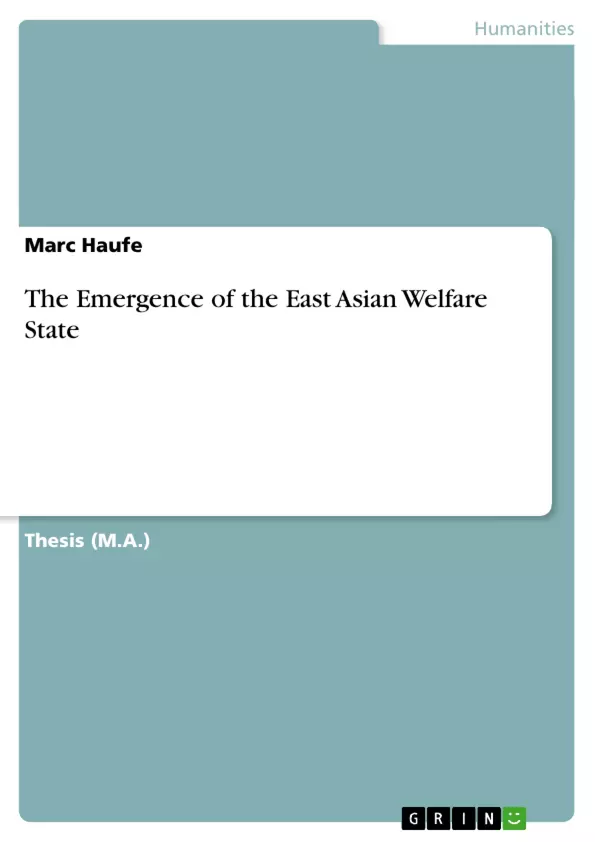This work analyses the specific structural characteristics and development specialities of East Asian welfare states. In a historical, qualitative and quantitative comparison of welfare development in East Asia and Southern Europe the East Asian tigers (despite all intraregional differences) are described as welfare societies without welfare state, The decisive foundation of this kind of welfarism is a Confucian productivism.
Inhaltsverzeichnis (Table of Contents)
- 1. Introduction.
- 1.1 Formulation of the Research Questions
- 1.2 Content
- 2. Methodological Part
- 2.1 Comments on Terminology and Definitions.
- 2.2 Data Sources....
- 2.3 The Comparative Method in General..
- 2.4 Quantitative and Qualitative Comparisons of Welfare States...
- 2.5 Selection of Cases
- 3. Theoretical Part......
- 3.1 Functionalist Explanation Models: The Logic of Industrialism..
- 3.2 Conflict-Theoretical Explanation Models
- 3.3 The Three Worlds of Welfare Capitalism by Esping-Andersen
- 3.4 Applicability of Esping-Andersen's Approach to East Asia
- 4. Development of Welfare Systems in East Asia ........
- 4.1 Overview Historical Development....
- 4.2 Development of the South Korean Welfare System
- 4.2.1 Health Insurance..
- 4.2.2 Occupational Injury.
- 4.2.3 The Pension Program.
- 4.2.4 Unemployment Insurance
- 4.3 The Development of the Taiwanese Welfare System
- 4.3.1 Health Care...
- 4.3.2 Occupational Injury.
- 4.3.3 The Pension Program
- 4.3.4 Unemployment Insurance
- 4.3.5 Social Assistance....
- 4.4 The Development the Welfare System in Hong Kong.
- 4.5 The Development of the Singaporean Welfare System
- 4.6 Funding: Similarities and Differences....
- 5. East Asian and South European Welfare Systems Compared
- 5.1 The South European Countries
- 5.2 Historical Comparison.........
- 5.3 Comparison in the Qualitative Perspective
- 5.4 Quantitative Comparison.......
- 6. Explanations for Different Development
- 6.1 Conflict-Theoretical Approach: Democratization and Welfare State Development
- 6.2 Cultural Explanation: Confucian Type of Welfare State.
- 6.3 Developmental Approach...
- 6.4 Discussion
Zielsetzung und Themenschwerpunkte (Objectives and Key Themes)
The aim of this thesis is to explore the development of welfare systems in East Asian countries, specifically South Korea, Hong Kong, Taiwan, and Singapore. It seeks to determine the similarities and differences between these emerging welfare states and Western welfare state models, analyzing the factors contributing to their distinct development. The thesis aims to contribute to the understanding of social policy in non-Western regions, particularly in East Asia.
- The emergence of welfare states in East Asia.
- Comparative analysis of East Asian welfare states with Western models.
- Exploration of the factors influencing welfare state development in East Asia.
- Examination of the applicability of Western-based welfare state theories to East Asian contexts.
- Comparative analysis of East Asian welfare states with those in Southern Europe.
Zusammenfassung der Kapitel (Chapter Summaries)
The thesis is structured in six chapters, providing a comprehensive overview of the development of welfare states in East Asia.
- Chapter 2: This chapter introduces the methodological framework of the thesis, discussing terminology, data sources, the comparative method, and the selection of cases. It lays the foundation for the subsequent analysis.
- Chapter 3: This chapter presents traditional welfare explanation models, providing a theoretical background for the reader. It then explores the applicability of Esping-Andersen's "Three Worlds of Welfare Capitalism" framework to East Asia.
- Chapter 4: This chapter delves into the development of welfare systems in East Asia, examining historical developments, social security systems, and health care policies in South Korea, Taiwan, Hong Kong, and Singapore.
- Chapter 5: This chapter presents a comparative analysis of East Asian welfare states with those in Southern Europe, examining similarities, differences, and historical, political, and economic factors contributing to their development.
- Chapter 6: This chapter focuses on explaining the unique features of East Asian welfare state development, exploring conflict-theoretical, cultural, and developmental approaches. It discusses the strengths and weaknesses of these explanations in light of the empirical findings.
Schlüsselwörter (Keywords)
This thesis explores the emergence and development of East Asian welfare states, focusing on South Korea, Hong Kong, Taiwan, and Singapore. It utilizes a comparative approach to examine similarities and differences between East Asian welfare states and Western models, exploring the applicability of traditional welfare state theories to this region. The study also includes a comparison with South European welfare states. Key concepts include emerging welfare states, East Asian welfare systems, comparative social policy, Confucian values, development state, and democratization.
Frequently Asked Questions
What is meant by the "East Asian Welfare State"?
It refers to the specific social policy models of East Asian "tiger" economies like South Korea, Taiwan, Hong Kong, and Singapore, which are often described as welfare societies without a traditional Western-style welfare state.
What is "Confucian productivism"?
Confucian productivism is a cultural and economic foundation where social welfare is closely tied to economic productivity and family responsibility, influenced by traditional Confucian values.
How does the South Korean welfare system differ from others?
South Korea has developed comprehensive systems for health insurance, occupational injury, pensions, and unemployment insurance, showing a rapid transition towards a more institutionalized welfare state.
Can Esping-Andersen's "Three Worlds of Welfare Capitalism" be applied to East Asia?
While the framework provides a baseline, scholars debate its applicability because East Asian systems often blend elements of different models or follow a unique "developmental" logic not found in the West.
What is the connection between democratization and welfare in East Asia?
Research suggests that democratization in countries like Taiwan and South Korea acted as a catalyst for the expansion of social security systems and broader welfare rights.
How are East Asian welfare systems funded?
Funding varies but often relies heavily on social insurance contributions from employers and employees, with a strong emphasis on individual and family self-reliance compared to Southern European models.
- Quote paper
- Marc Haufe (Author), 2005, The Emergence of the East Asian Welfare State, Munich, GRIN Verlag, https://www.grin.com/document/43146



